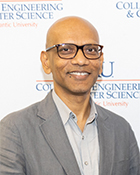To improve the way videos are shared around the world, Hari Kalva, Ph.D., chair and professor in the Department of Electrical Engineering and Computer Science in the College of Engineering and Computer Science, has developed new methods of compressing file sizes that enable efficient video transmission without loss of quality. These innovations are vital for communicating information across multiple industries including healthcare, transportation, and defense.
As the director of the Multimedia Lab at Florida Atlantic, Kalva is involved in projects related to visual computing and communication standards. His research interests also include video transcoding, multimedia programming and universal multimedia access. Kalva is a co-inventor of more than 40 patents related to digital media and telecommunications, several of which have been classified as essential to the standards that govern virtually all modern video streaming services.
Kalva earned a bachelor’s degree in electronics and communications engineering from Sri Venkateswara University in Tirupati, India, a master’s in computer engineering from Florida Atlantic University, and a doctorate degree in electrical engineering from Columbia University.
How did you first become interested in visual information processing and multimedia?
I became interested in this area when I was taking a course on the topic as part of my master’s degree program. At that time, it was a new field. Dr. Borko Furht was teaching one of the first courses in the U.S. on multimedia systems. In that graduate course, I explored a new research project that was exciting. That’s how I got my start. It’s a new area of development, so that gives me an opportunity to do a lot more within that space.
How do you see your research benefiting the public?
Our research broadly spans processing visual information in the interest of or in service of specific problems. Visual information is imaging, video, or anything that we visually see. There are a number of applications. For instance, if you are monitoring roads, you can estimate traffic congestion. If you are monitoring a patient, you can see the patient's responses to certain treatments. So those types of problems. Some of the work we do also applies to solving problems in public safety or making video better so that people are more entertained and it costs less.
What is your most interesting research accomplishment?
One thing I did during my Ph.D. turned out to have a very broad impact and was relevant to all of the streaming technology that is used today. It is nice knowing that every device out there is implementing a technology that is based on your study. One problem area that we are excited about currently is applying image and video analysis for ecological conservation. We’re working with a national park in South Africa where they are developing vision systems that allow smarter monitoring of ecological conservation spaces. These systems will make it more efficient to collect data and help conservation in general.
In the next 5 years, what new developments and innovations can we expect to see in your research?
I think what we are beginning to see is the impact of AI in other areas. In the analysis space, leveraging generative AI to solve problems in a better way – that’s one area we are exploring. In other spaces, there is a new generation of cameras and more efficient systems for capturing the world. All of this can be integrated through more immersed visual experiences using augmented reality to more effectively solve various problems. Those are a couple of areas I can see coming up in the next few years.
Discuss a positive experience with the Office of Technology Development.
The Office of Technology Development, for us, has been a great partner for facilitating collaborations and finding the right type of industry partnership. I like the fact that they are flexible and work with companies with different needs and tailor agreements to take into account researcher interests. We work with Dana and her team regularly and we could not be happier about how our collaboration is going.
What is an interesting fact that people at FAU may not know about you?
Maybe something people will be surprised to know is that I don’t have hidden talents. I do a little bit of photography and different things. I enjoy traveling, coffee and good food – any of those. If there is good food, I will drive to go find it.
